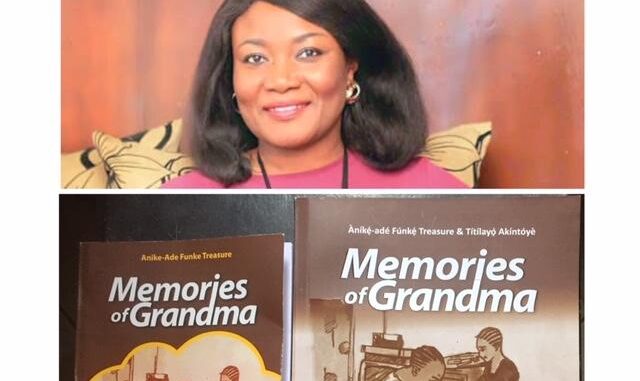
Memories of Grandma is a fascinating account of some aspects of Anike-ade Funke Treasure’s childhood years in Ijebu-Ode, Ibadan, Ode-Omu and Dagbolu—all in the South-Western Nigeria. The author grew up knowing and being loved dearly by her four grandparents and family relations. She was particularly fond of her maternal grandmother who was a well-respected community leader for her good character, acute business sense and, more interestingly, for being a repository of folk wisdom and philosophy of the Yoruba. Staying with her during holidays, Funke, at age eleven, learnt so much from her because she was very inquisitive and the grandma had the patience, the understanding and industry of a wonderful teacher. In love and deep affection, Funke was told many life-affirming and life-moulding stories by her grandma. She shares these stories with us in this book.
Why is Funke taking us back to the countryside of her childhood in this season of restless, physical and mental migration to the city and to the industrialised world? The reason is very clear. True, the village that she knew was rustic and poor materially because of mindless neglect, but it was where you had people who lived in close interaction with Nature. The pristine village life that Funke describes in this book was where you had ethical harmony and natural egalitarianism, not the current rabid individualism. It was a village that never tolerated indolence, laziness, robbery, ingratitude, envy, greed, injustice and other vices. It was a village that celebrated courage, beauty, love, wisdom, contentment, old age, etc., etc. Not a stagnant society, it was clearly a society that was anchored on core principles and guiding values. Funke is reasonably nostalgic, if not a bit sentimental, about these values because they are now being constantly eroded, assaulted and destroyed.
Funke describes how the countryside people in the not distant past purified, refrigerated and preserved their water; she describes how they made some delicacies and prepared some tasty foods. She tells us that they knew the names of many trees and which of them could be used for curative medicine; I was particularly struck by her description of how palm-oil is made. They knew the amount of information that should be shared and the limits and limitations of their freedom of expression. In some of the folk tales and songs in this book, the supernatural mingle with the Homo Sapiens, the inanimate talk, animals find their own voices, and these voices are heard loud and clear—all geared towards the betterment of the human race. The folktales, parables and songs here make the ideas in this book easy to grasp. In closing, the Illustrations of nearly all the twenty two chapters and some of the songs rendered by Funke, Akeem Lasisi and Edaoto Agbeniyi and others, plus the colourful workbook (co-authored by Titilayo Akintoye), make the dissemination of knowledge in the book a lot easier and more interesting.
-Mr Kunle Ajibade, Executive Editor/Director of TheNEWS and PM NEWS, Lagos, read this ten-minute review at the virtual presentation of Memories of Grandma on Monday 16 November 2020.
END

Be the first to comment